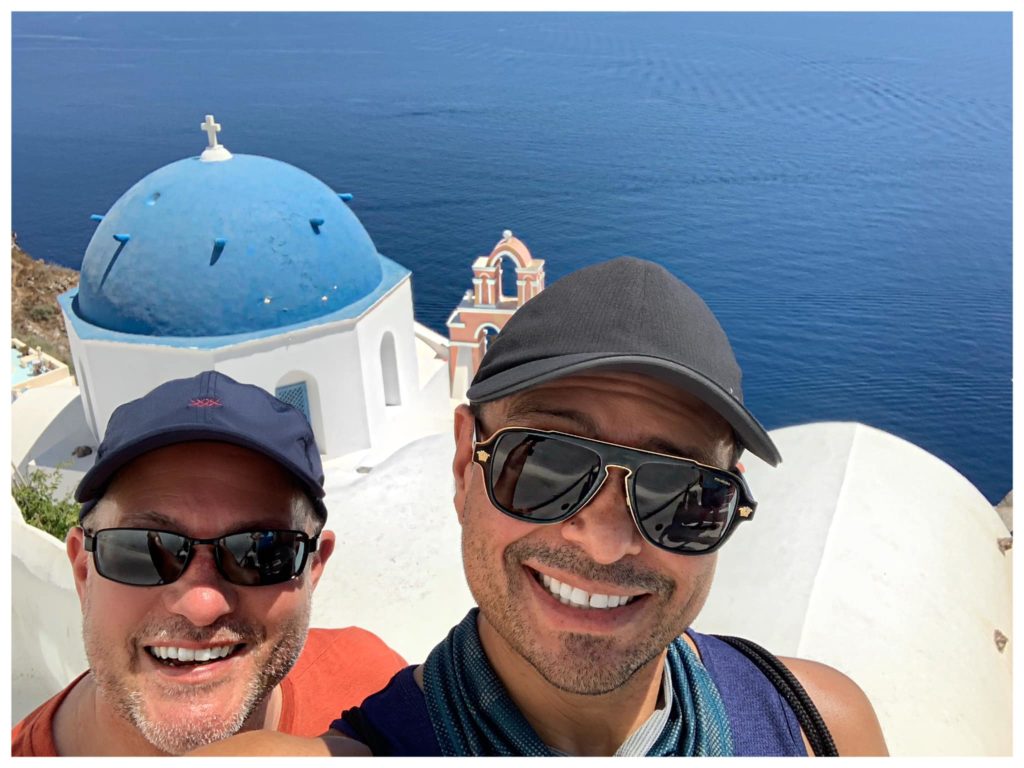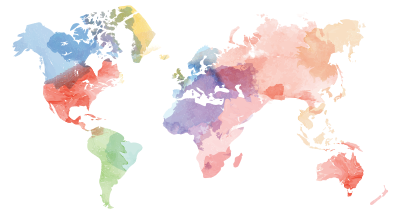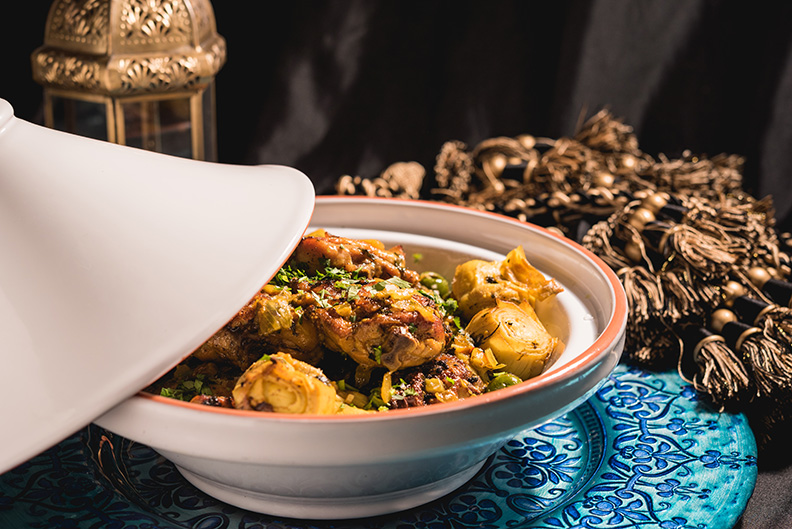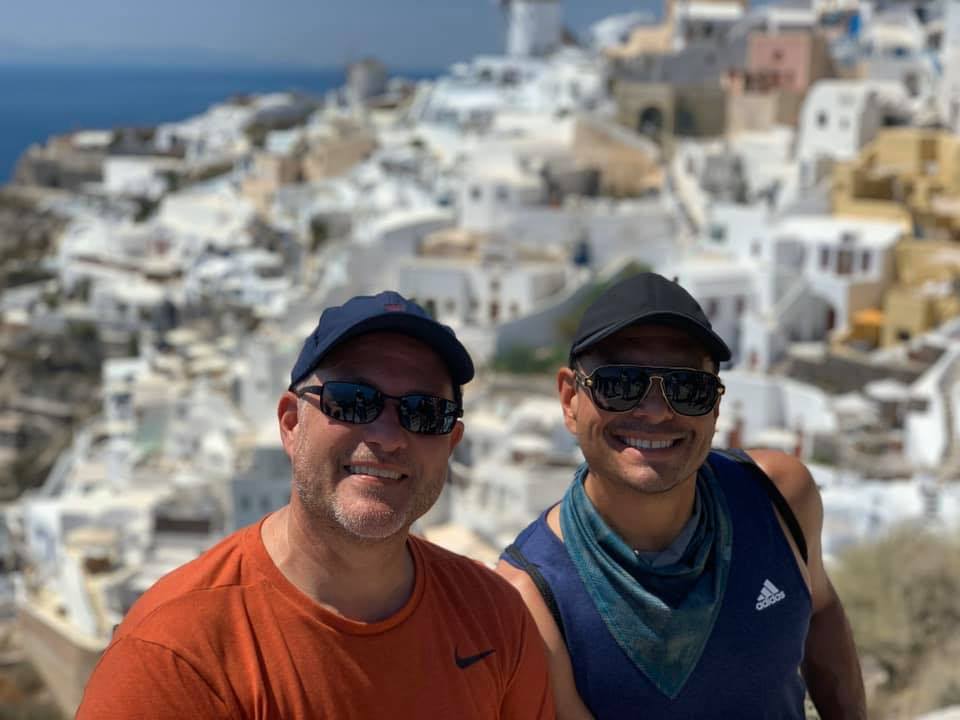The Painted Table chefs, Rod and Jeromie Hanson, travel the world to bring back new menu ideas to please your guest’s discerning palates. They take the exotic and blend it with a tapestry of locally sourced, seasonally fresh California Central Valley items to create one-of-a-kind recipes for your enchanted culinary journey.

Follow along with our chefs on their 2020 Culinary Experience! Tune in with them on their annual food travel trek as they capture and share videos that reveal the marvels of each region’s culinary highlights and local culture. Discover the catalysts that alight their imaginations to bring back home inspiration to their Central Valley culinary team.

This year, Chefs Rod and Jeromie are exploring the delectable wonders of Barcelona, Morocco, and Portugal. Your passport is ready. Join as an armchair traveler and follow their exotic adventures. Fun and delight await you in their epic food travels to:
Barcelona
With streets lined with spacious restaurant terraces and colorful cafés, this capital of the Catalan community serves up pintxos (little individual food bites) and tapas (small plates of food meant for sharing). Sampling these delights while wandering the streets makes it easy to eat all day!
Of course, you’re familiar with paella, the heavenly mixture of seafood, meat, or just veggies combined with rice and paprika. And you’re familiar with gazpacho, the chilled tomato soup. Fried or grilled calamari and squid are a local favorite, too. But are you familiar with patatas bravas, Spain’s answer to french fries? They are crispy potato wedges served with creamy aioli and spicy magical secret sauces. Discover pa amb tomàquet, which looks like small pizza slices, but you’d be mistaken. They are simple slices of bread massaged with olive oil and tomatoes and sprinkled with salt, then grilled or warmed. Bombas (fried meat and potato balls served with aioli sauces) and croquettas (oval-shaped cheese and chicken or iberico ham fritters), served with salted, blistered peppers, also form an integral part of the street food landscape.
Then there are the cheeses: the region is known for Manchego cheese, the salty, nutty, hard aged sheep’s milk originating from Spain’s La Mancha region. And the star of the mel i mató dessert is the mató cheese, the local Catalonia cheese with the consistency of unsalted ricotta, made with sheep or goat milk. In this dessert, the cheese is drizzled with honey and toasted walnuts.
Chefs Rob and Jeromie will be seeking out the sweet, as well as the savory. Barcelona is known as one of the best locations to devour bunyols, donuts with an added kick of anise liquor to flavor the batter. Then there’s crema catalana, which is not your typical French crème brûlée, because it’s flavored with the addition of cinnamon, citrus, and vanilla. Come along and make dessert discoveries with our intrepid chefs.
Behold these luscious delights as our chefs stroll the Plata de Catalunya, Barcelona’s answer to Time’s Square. View their finds at La Boqueria Market, the outdoor old town street market dating back to 1297, filled with over 200 stalls selling a bounty of farm-fresh produce, spices, seafood, and crafts. Meet the people and the culture of Barcelona when they check out the city’s exciting nightlife.
Morocco
A gastronomical feast awaits our chefs in Morocco, known for aromatic seasonings and intriguing dishes that stir the imagination. The diverse landscape of this North Africa country is the host of vibrant culinary traditions. The combination of influences from France, Arabia, and Adalusia Spain produce mouthwateringly unique flavors. Influenced by Berber, French, Arabic, and Jewish cultures, Moroccan cuisine produces a cornucopia of fantastic possibilities.

Morocco’s national dish, couscous, or seksu, is the well-known fine wheat pasta. But this isn’t served as a side dish, as it appears on many American tables. Traditional Moroccan couscous is rolled by hand and steamed over a stew of veggies and meat. Then, it is served over meat in the shape of a pyramid, with the vegetables pressed into the sides. A garnish of raisins and a side serving of buttermilk finish the dish in the Berber style.
B’stilla, the pinnacle of Fez or Fassi cuisine, is a pie constructed of layers of paper-thin pastry (warga) enveloping a savory mixture of chicken (traditionally pigeon), omelet, and fried almonds infused with orange water. It’s a feast for the eyes and the palate, flavored with saffron, cinnamon, and fresh coriander, and then dusted with powdered sugar and cinnamon. The aroma, texture, and tastes found in each tasty bite of b-'tilla are otherworldly.
Tagine, a slow-cooked stew containing a myriad of beef, lamb, chicken and vegetable combinations, takes its name from the unique ceramic pot with a cone-shaped lid, which is also called a tagine. The ingredients are arranged in a conical fashion and left untouched until they become tender and are ready to be served. The dish is served in its cooking vessel, alongside khobz (crusty bread baked in wood-fired ovens) and scooped and eaten by hand. Chefs Rob and Jeromie are thrilled to bring these fresh, tasty visual and aromatic presentations back to delight their Central Valley clients and guests.
While Morocco is famous for their lamb, chicken, and beef tagines, and their tender meat kebabs, they are also known for their veggie dishes. Vegetarian-friendly tagines and couscous are plentiful. Meat-free versions of harira—an aromatic soup steeped with tomatoes, chickpeas, lentils, and lamb and topped with coriander and lemon juice—take vegetarianism to a whole new level. Baba ganoush (cooked eggplant mixed with tahini, garlic, cumin, olive oil, and black olives, hummus) and a rainbow of Moroccan mixed salads are a compliment for any table.
Morocco’s proximity to the Mediterranean and Atlantic coasts make a huge array of seafood dishes available, including fish chermoula, a feast of fresh delights marinated in herbs and spices, grilled, and served with a dipping sauce. Did you know that sardines are a main staple, making up more than 62% of Morocco’s fish catch? Visitors also indulge in anchovies, mackerel, and prawn dishes.
Chefs Rob and Jeromie may top off a meal with mint tea, known as “Moroccan whiskey”. This heavily sweetened gunpowder tea is steeped with sprigs of spearmint and then poured from high above to create a frothy crown. Desserts go far beyond baklava. Tag along with our chefs as they sample the countless combinations of sweet morsels made with honey, dates, nuts and seeds, and sugar and spice. They’ll wander lush oases, fishing ports, cities, and countryside villages to seek out the best flavors to bring back home.
Portugal
The rib-sticking fusion of Portuguese flavors beckons Chefs Rob and Jeromie for a visit. The extreme diversity of tastes is astounding. In this country only the size of Indiana that sees some 300 days of sunshine per year, maritime and Mediterranean flavors Intermingle to dance upon the taste buds.
This food lover’s paradise boasts museums solely dedicated to olive oil, bread, cheese, cherries, wine, bear, and more. In fact, Portugal won the Guinness World Record for serving the largest bucket of snails on record (2,449 lb.). Yes, snails (caracóis) served up piping hot in a traditional herb broth, are a favorite delicacy.
Portuguese soups transform the meaning of comfort foods. Caldo verde, composed of potatoes, onions, kale, garlic, and olive oil, performs double duty as a dip for cornbread with a side of linquica (smoked pork sausage). This basic fare is the go-to dish for partiers to embrace after a night of reveling, and it’s a tradition to sip as a welcome to the New Year. Locals also turn to sopa da pedra (stone soup), the soup with the legend: A monk had nothing to eat, so he cleaned a stone and boiled it. As people passed him by, they felt sorry for him and threw assorted tidbits into the simmering broth, such as a bag of beans, a few potatoes, a hunk of meat. When the soup took shape into a meal, he invited the villagers to join him. Today, this sopa de pedra contains a wide assortment of ingredients, customized by the cook and shared among good friends.

Join our intrepid chefs from The Painted Table as they break bread with their newfound Portuguese friends over fresh wonders from tiny fishing villages, including peixe grelhado (grilled fish coated with coarse salt), sardinhas (grilled and served as a tasty snack atop bread aside a salad of grilled veggies), Amêijoas à bolhão pato (clams swimming in olive oil sauce), bacalhau (recipes that feature salted, dried cod fish), polvo (octopus served up any way, from grilled or roasted, in salads and rice, as an appetizer or the main entrée), to cataplana de marisco (a seafood that features a customized combination of fish and shellfish).
Stews reign supreme in Portugal—Tripas à moda do porto (tripe stew) and Cozido à Portuguesa (rustic meat stew) are staples. Carne de Porco Alentejana (pork and clams) is Portugal’s answer to surf and turf, where marinated meat is fried in batches and served smothered with clams and coriander.
What’s for dessert? Portugal’s pastel de nata (mini custard tarts) are all the rage around the globe—These little eggy delights made a splash as London street food and are appearing in New York City as a hot new food trend. Chefs Rod and Jeromie can’t wait to create their version for their Central Valley clients. Or maybe they’ll create a Central California version of ginja em copos chocolate (sour cherry liqueur in chocolate cups) for dessert.
The Adventure Starts Soon
Get ready to accompany The Painted Table chefs on a food travel journey of a lifetime. They’ll return with fresh inspiration for future secret suppers at the award winning Fresno Underground Supper Club. Watch how their adventures shape and influence their deliciously eclectic full service catering menus and luxurious event designs. Connect with our chefs on Facebook, Twitter, YouTube, and Instagram to get up-to-the-minute news about the launch of their 2020 Culinary Experience travels. Contact us at (559) 443-7199 to learn about The Painted Table’s customized culinary experiences and find out how our design team transports your event to exotic new ports of call.



